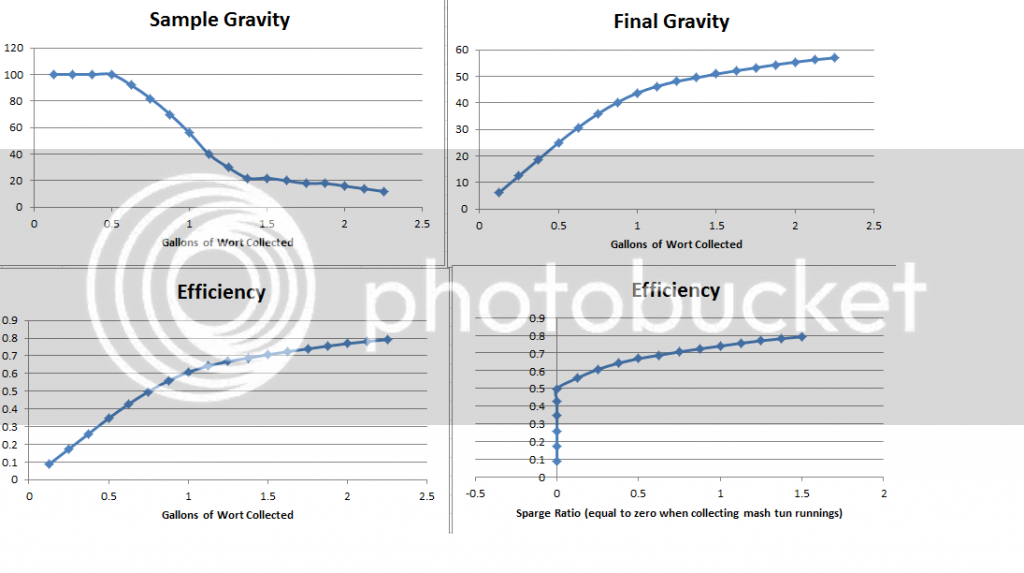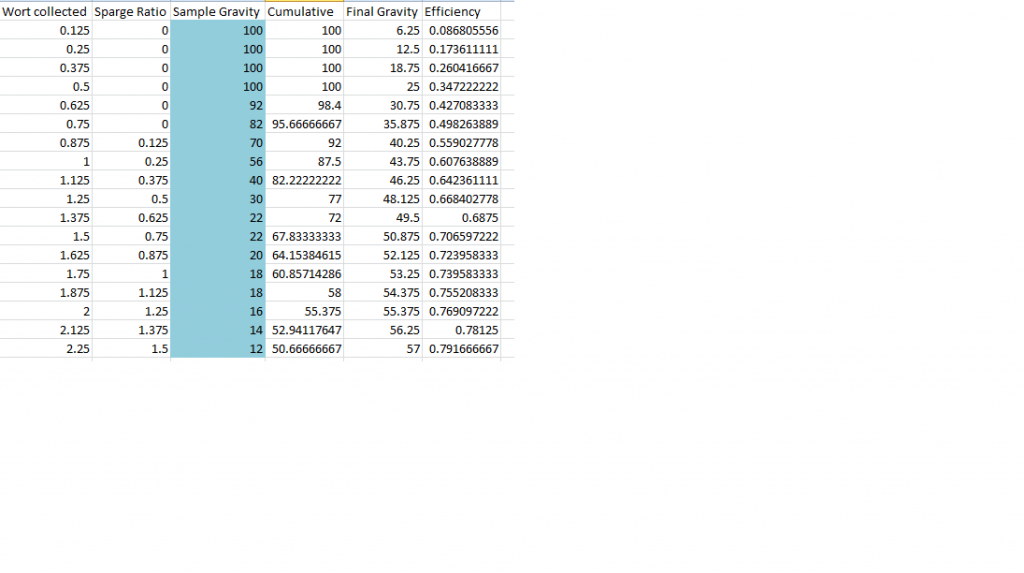gregoreckbrews
Active Member
When preparing to run my first very big beer on my 5Gallon all-grain setup (20lbs of grain), I realized that the sparge ratio would be very small in comparison to what is normally used. I usually collect around 7 or 7.5 Gallons in the boil kettle. Some quick estimates:
20lbs *1.25qts/lb = 6.25 Gallons
Mash loss of ~0.125 Gallons/lb = 2.5 Gallons
Total Mash collection = 6.25-2.5 = 3.75 Gallons
Sparge water to reach 7.5 Gallons = 7.5 - 3.75 = 3.75 Gallons
Sparge ratio = 4*3.75/20 = 0.75 qts/lb
This is half of the usual ~1.5qts/lb number
I was curious about the efficiency drop off as sparge water decreased, but I wasn't able to find any decisive documentation. So I decided to run a simple experiment.
Disclaimer: I know there are some gaps in measurement quality in this experiment. And I don't know how well it scales or how repeatable it is.
The experiment:
Start with 4lbs of 2-row. Assume 100% efficiency would yield 36 points/lb*Gallon.
Mash at 152F in a cooler
Collect runnings and fly sparge as normal
One difference: collect all the running in plastic cups that hold exactly 2 cups volume. The gravity of each of these 2cup samples can be measured to judge the increase in sugar received from each successive sparge sample.
Goal:
Build a table showing the efficiency change as sparge water increases
I mashed with 1.25 qts/lb ratio. 4*1.25/4 = 1.25 Gallons
Assuming 0.125Gallon/lb mash loss, I would collect 1.25-4*0.125=0.75Gallons
I sparged with 1.5Gallons of water. (1.5*4/4=1.5qts/lb)
In the end, I collected 18 2cup samples. (18*2/16=2.25 Gallons)
The first runnings from the mash tun can be used to find conversion efficiency. I measured a gravity of 1.1. 100 points. 36*4/1.25=115 ideal points. 100/115 = 87% mash conversion. So if I had 100% sparge efficiency, I would end up with 87% total efficiency.
Since I collected 2.25 Gallons and targeted this as 2 Gallon batch:
36*4/2*0.87=63 points or 1.063
(The batch size target is arbitrary but must remain a constant.)
So 1.063 is the 100% sparge efficiency or 87% total efficiency target.
Here are the results:


Some comments:
Moving from 0.75qts/lb to 1.5qts/lb sparge ratio moves my total efficiency from 70% to 80%. (Or moves from about 80% to around 90% sparge efficiency).
Ideally the first 0.75Gallons collected would be a constant gravity, but of course the sparge water will start to dilute the mash before all of the mash running are collected since it is a fly sparge. This is why the gravity drops from 100 points to 95 points between 0.5 and 0.75 Gallons collected.
Conclusions:
If the data holds up, I could lose around 10% efficiency when dropping the sparge ratio from 1.5 to 0.75.
I plan on using this data to budget the impact of big beer / low sparge ratio effects. I haven't tested it on a real beer yet.
20lbs *1.25qts/lb = 6.25 Gallons
Mash loss of ~0.125 Gallons/lb = 2.5 Gallons
Total Mash collection = 6.25-2.5 = 3.75 Gallons
Sparge water to reach 7.5 Gallons = 7.5 - 3.75 = 3.75 Gallons
Sparge ratio = 4*3.75/20 = 0.75 qts/lb
This is half of the usual ~1.5qts/lb number
I was curious about the efficiency drop off as sparge water decreased, but I wasn't able to find any decisive documentation. So I decided to run a simple experiment.
Disclaimer: I know there are some gaps in measurement quality in this experiment. And I don't know how well it scales or how repeatable it is.
The experiment:
Start with 4lbs of 2-row. Assume 100% efficiency would yield 36 points/lb*Gallon.
Mash at 152F in a cooler
Collect runnings and fly sparge as normal
One difference: collect all the running in plastic cups that hold exactly 2 cups volume. The gravity of each of these 2cup samples can be measured to judge the increase in sugar received from each successive sparge sample.
Goal:
Build a table showing the efficiency change as sparge water increases
I mashed with 1.25 qts/lb ratio. 4*1.25/4 = 1.25 Gallons
Assuming 0.125Gallon/lb mash loss, I would collect 1.25-4*0.125=0.75Gallons
I sparged with 1.5Gallons of water. (1.5*4/4=1.5qts/lb)
In the end, I collected 18 2cup samples. (18*2/16=2.25 Gallons)
The first runnings from the mash tun can be used to find conversion efficiency. I measured a gravity of 1.1. 100 points. 36*4/1.25=115 ideal points. 100/115 = 87% mash conversion. So if I had 100% sparge efficiency, I would end up with 87% total efficiency.
Since I collected 2.25 Gallons and targeted this as 2 Gallon batch:
36*4/2*0.87=63 points or 1.063
(The batch size target is arbitrary but must remain a constant.)
So 1.063 is the 100% sparge efficiency or 87% total efficiency target.
Here are the results:


Some comments:
Moving from 0.75qts/lb to 1.5qts/lb sparge ratio moves my total efficiency from 70% to 80%. (Or moves from about 80% to around 90% sparge efficiency).
Ideally the first 0.75Gallons collected would be a constant gravity, but of course the sparge water will start to dilute the mash before all of the mash running are collected since it is a fly sparge. This is why the gravity drops from 100 points to 95 points between 0.5 and 0.75 Gallons collected.
Conclusions:
If the data holds up, I could lose around 10% efficiency when dropping the sparge ratio from 1.5 to 0.75.
I plan on using this data to budget the impact of big beer / low sparge ratio effects. I haven't tested it on a real beer yet.


